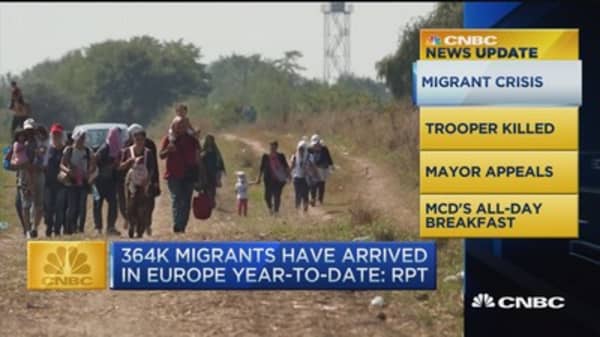How was it possible that nobody knew about that? Jean-Claude Trichet, the former President of the European Central Bank (E.C.B.) had the answer: "They all knew about it … but they just let it go."
Can you then blame an angry German Chancellor Angela Merkel for roiling the markets with incendiary statements and imposing debilitating austerity policies to punish the fiscal transgression and banks' mismanagement in a number of euro area countries?
Yes, you can.
As a key euro area member, Germany had the responsibility to help enforce the fiscal and financial treaty obligations binding the countries where the euro serves as a legal tender. Anger and vindictiveness are no substitutes for anticipating problems and applying proper policies.
Read MoreAustria to end 'open border' emergency measures
Just like barbed wires and deaths in disintegrating boats, refrigerator trucks and overcrowded trains are no answers to the refugee crisis, measures of severe fiscal austerity in recessionary economies were not the proper policies to deal with the euro area's rising joblessness and poverty.
The devastating results of austerity policies are still with us six years after the onset of the euro area financial crisis, punctuated by the outbreak of a relatively minor Greek problem that Europeans mismanaged into an intractable economic, political and social catastrophe. The euro area is now struggling with mass unemployment, a weak financial system and a free-money policy that is gaining very little traction with the real economy.
Dreaming of growth
The E.C.B. probably did not surprise anybody last Thursday when it lowered its growth and inflation forecasts for the euro area. The only surprise might be that the bank erred on the side of optimism – unless the refugee crisis forces Germans to step up substantially their government spending.
Let's hope that some of that could happen because Germans have announced large staff additions in the public sector to process and resettle the incoming refugees. Germany also intends to accelerate housing construction in order to accommodate by next month refugees who are currently living in tents and other temporary shelters.
With a budget surplus of 0.5 percent of GDP, Berlin can afford to finance all that.
Still, German economic growth would have to move up very rapidly in the second half of this year - from a rather subdued 1.3 percent pace in the first two quarters - in order to rev up the euro area demand and output. Indeed, to meet the E.C.B.'s downgraded euro area growth forecast of 1.4 percent in 2015, the rate of growth would have to accelerate to 1.8 percent in the July-December interval from a lethargic 1 percent pace in the first half of this year.
Apart from a possibility that the Germans could do something, where else is that going to come from?
As things now stand, only Spain – a relatively small 12.3 percent of the euro area GDP – shows a steady increase in economic activity. But the French and Italian economies – another 36.2 percent of the euro area GDP – grew only 0.9 percent and 0.3 percent, respectively, in the first half of this year, as their double-digit unemployment rates remained virtually unchanged since last January.
The E.C.B.'s latest data on credit growth also call for a great deal of caution. The fastest growing credit aggregate is the lending to governments (+5.8 percent in the year to July) because banks continue to use most of the free money provided by the E.C.B. to buy public sector bonds. However, the credit demand for business investments (+0.9 percent) and private consumption (+1.9 percent) is much weaker, even though both components show some progress from previous months.
Not to worry, though, is the word from some European bankers. They want the euro to be kept down to boost exports as a major source of growth in the months ahead.
The question is – exports to where and exports by whom?
Read MoreEurope rallies after Draghi raises QE hopes
The smartly growing U.S. economy is the only promising destination for the euro area exports. But that is a tough market, because there is a strong competition there from China, Japan and South Korea. In the first half of this year, these three countries exported 7.4 percent more goods to the U.S. than the entire euro area.
Where else can the Europeans sell on a big scale? Nowhere, I believe. Having largely abandoned the Russian market as a result of sweeping sanctions, it is very unlikely that the Europeans can take on the Chinese, Japanese and South Korean companies in Asian markets and come out winners.
Investment thoughts
Equity values of some of the bluest of Germany's global blue chip companies are down between 19 percent and 7.5 percent since the beginning of this year.
That is what markets think of the globally most competitive crown jewels of the German industry.
And here is what the German economy looks like: It is by far the euro-area's largest and fully-employed economy, with perfect price stability, balanced public sector accounts, a trade surplus of 7.5 – 8 percent of GDP – and all that fuelled by free money supplied in abundance by the E.C.B.
Picture perfect, isn't it? So, what's wrong? Is it again the proverbial China's fault, as Japan's finance minister implied in his comments at the G-20 meeting in Ankara, Turkey, last Thursday?
Or is it the old chestnut: "Don't worry, the European union has always progressed by crises."
Could it be that this refugee crisis has been one too many?
For the first time, the opinion poll just showed that most of the British wanted out of the E.U.; a rift is widening between union's founding members and the East European newcomers; and the terminally dysfunctional French-German relationship cannot keep things together.
In this barren landscape, the E.C.B.'s Mario Draghi looks like the last man standing. He is your only safe bet as long as he has the mandate to keep the euro going.





